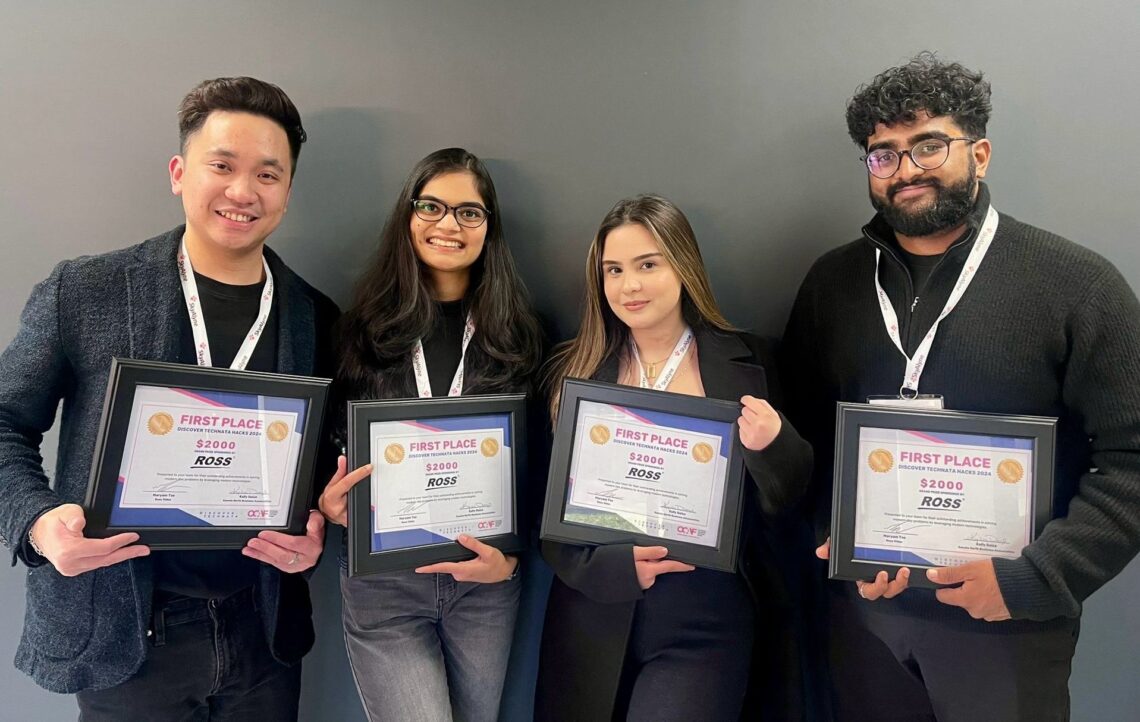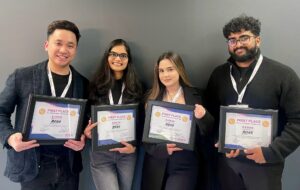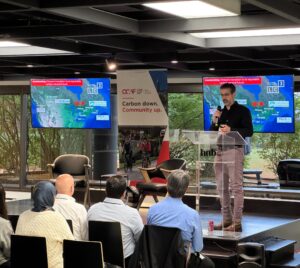
Back for its third year, the annual DT Hacks hackathon was a resounding success. With participating students from Carleton, uOttawa, and Algonquin College, Hub350’s walls were packed with innovation and creativity.
Guy Levesque, Associate Vice-President of Innovation, Partnerships and Entrepreneurship at uOttawa, has had heavy involvement with the KNBA across many key verticals. “You know entrepreneurship, problem-solving and solution-seeking is in full swing when the KNBA holds the annual Discover Technata Hacks in the fall! I love seeing such engaged students from uOttawa, Carleton and Algonquin work together to tackle relevant problems and devise impactful solutions for Canada’s largest technology park.”
This year’s problem statement came from Ottawa Climate Action Fund and asked the students to tackle the problem of advancing Kanata North as a clean energy resilience district.
“The Ottawa Climate Action Fund envisions Kanata North tech park as a Clean Energy Resilience District in which the lights and heat stay on, and business continues uninterrupted, no matter the weather or state of the power grid by integrated low-carbon energy solutions within the special economic district.”
“[There are] critical issues surrounding energy and climate change, where energy demand in Kanata North is growing and there are already significant restraints on the power grid,” shared Steve Winkelman, Executive Director at OCAF. “So, how do we meet that challenge?”
“Kanata North is growing and there are already significant restraints on the power grid.”
The winning team was Algonquin students Jake Shaju, Revati Milind, Danny Nhu, and Yara Saadalin, studying Human Center Designs. They believed that the solution could be found in an AI-controlled power nest: a cutting-edge, modular renewable energy source that combines wind and solar power, and can store energy for use during outages, storms, and peak hours.

When asked how they came to this solution, Yara remarked, “Speaking with mentors was very helpful because we would think of a solution, and then we would talk to them, and they would give us insight.” Those insights helped them refine their ideas into a winning, market-ready pitch.
“You don’t need to know everything to find a strong solution.”
Jake explained how their background was in research, not in a technical field. However, his take-away from this event came from seeing how the importance of research could be applied in real life.
Yara, too, found encouragement within this. “It was really nice to see that you can still tackle a problem even if you know nothing about it. You don’t need to know everything to find a strong solution.”
Coming in second place was team Greennata Microtransit, with team members Jae Li, Jierong Zhang, and Yizhuang Lin, and in third place was team EcoIntelligence, with team members Lina Alkhani, Qurb e Muhammad Syed, Saim Hashmi, and Srivathsan Murali.
“It’s a two-way street. Always. Never a one-way street.”
One of the main pillars of KNBA involves talent and cultivating a pipeline between post-secondary institutions and the tech park, to both raise the profile of Kanata North and to drive top talent to the region. This ensures that talent is prepared to enter the workforce here, which is everchanging and always on the forefront of new technology.

While the hackathon is beneficial to students in that it provides networking opportunities, exposure to the working world, and allows them to apply classroom knowledge to current issues, John Brennan, CAE’s judge and mentor, explains that it is a two-way street.
“Really, it’s a win, win, win.”
When asked why CAE decided to sponsor this event, he shared that one of the key components was “to connect with the students, because the students are the people we need to be hiring over the next several years.”
Steve Winkelman explains how this event gives mentors, who have a demand for highly skilled employees, the chance to get to know the future talent: the students. He remarks: “Really, it’s a win, win, win.”
Additionally, this event provides mentors the opportunity to impact students in a positive way. Marco Cen, a volunteer mentor, discusses that it was passion which prompted him to become a mentor and that he loved watching student growth from the first to the last day. “It was super cool to see the top five because I had spoken to most of them. If I am able to contribute in a positive way, I love to see that.”
With this year’s hackathon coming to an end, one thing is certain: the experiences gained here will have a lasting impact—for all parties involved.
Discover Technata Hacks will return in Fall 2025, with a new problem to solve and new hackers up to the challenge.
By Ayla Sully, Kanata North Business Association
 “The Ottawa Climate Action Fund envisions Kanata North tech park as a Clean Energy Resilience District in which
“The Ottawa Climate Action Fund envisions Kanata North tech park as a Clean Energy Resilience District in which 